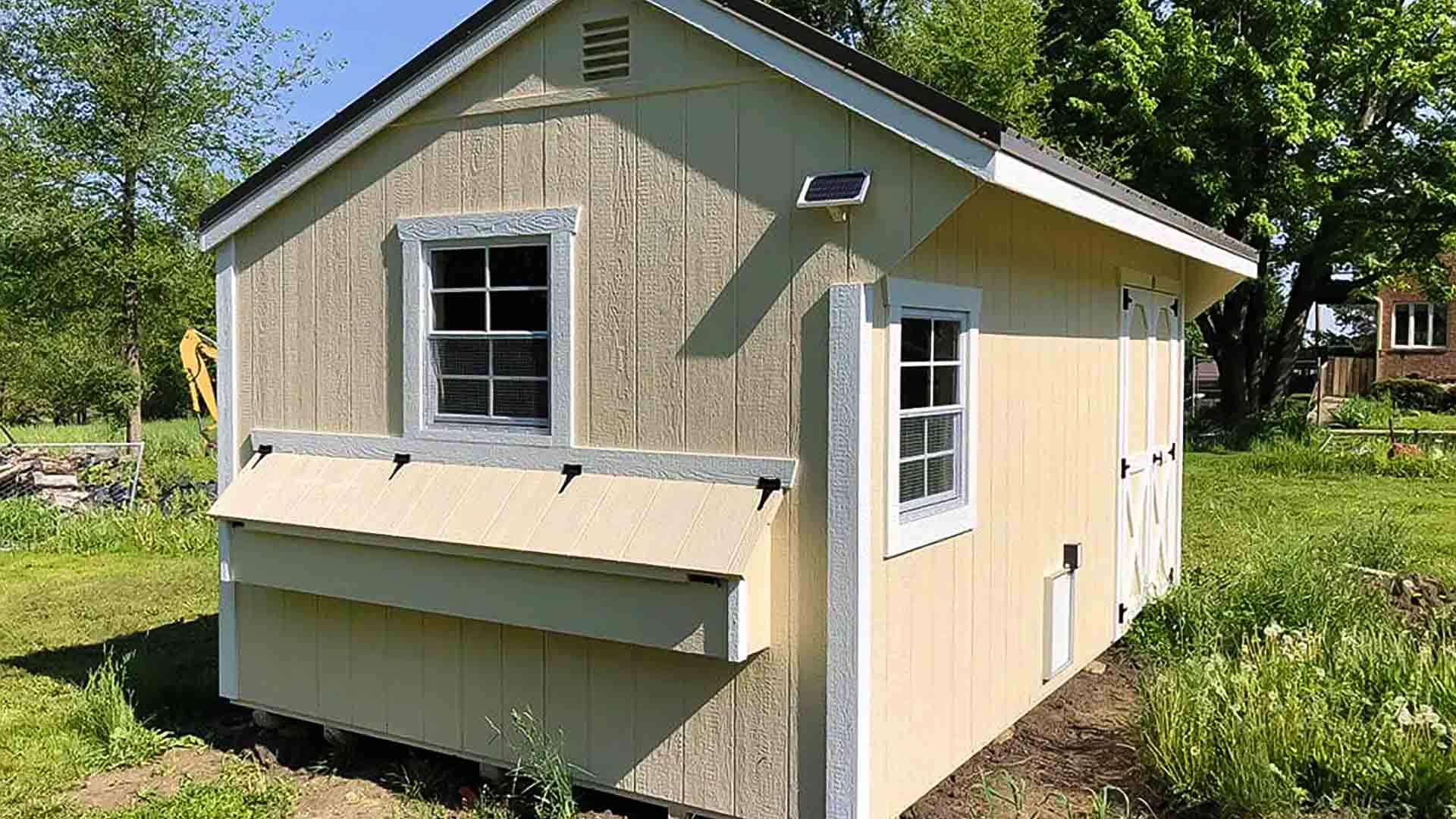
Your Beginner's Guide To Raising Chickens For Eggs
May 15, 2020
Raising chickens for eggs can be an incredibly therapeutic and beneficial hobby for you and your family. Not to mention the fact that you can save yourself a little money by not having to buy eggs. But if you're looking to get started for the first time, it can be a little daunting. So we at Sun Rise Sheds put together this beginner's guide to raising chickens to help you figure out what you need and what you can expect when trying to start raising your own flock of chickens.
Check Your Local Ordinances
Make sure your local township, county, or your deed do not have any restrictions that limit whether you can have chickens or the number of chickens you can keep. Checking local ordinances or limitations should be one of your first steps. You don't want to spend time, money, or effort into a backyard chicken operation that you can't legally have.
How Many Chickens Do You Need?
If you're looking to start your own flock for eggs, you need to determine what number of chickens will need. This means first figuring out how many eggs you're looking for in production. Do you just want a handful of eggs in the morning for your family? Or are you looking to have a little more than that? Perhaps you're looking to hand out a couple to close friends and family. Once you know how many eggs you're looking to have, you can look at which breed of chicken you want.
What Chicken Breed Should You Choose?
Different chicken breeds have different traits, so you must do your research before you buy. Some breeds are great with kids, others have a high yield of eggs, and some are more resilient to particular climates. Typically you're going to want to find hybrids that are bred from strong breeds. These are some of the most popular for families to raise in their backyard.
Blue Plymouth Rock
The Plymouth Rock chicken breed is a mix between the Andalusian and Plymouth Barred Rock breeds - making this breed a fantastic egg layer with a trusting temperament. It is the perfect breed for joining your family and will allow your children valuable interaction time. Typically the Plymouth Rock will lay between 280 to 300 eggs a year, and they're also a hearty breed that will continue to lay eggs even in slightly colder weather.
Novogen Brown
Novogen Browns are a hybrid between the Rhode Island Red and Leghorn breeds - making this an exceptionally prolific egg layer of almost 395 eggs a year! They're also bred to be hearty in colder conditions so they can continue to lay all year round, even during the winter months, as long as they have proper shelter.
Easter Egger
If you're looking for some more colorful eggs, the Easter Egger is perfect. They lay an average yield of 270 eggs a year. Their eggs are typically a blue/green color, but they've been known to lay brown and light pink eggs as well. They have a gentle demeanor, so they'll be great for your family to interact with and enjoy.
What Kind Of Chicken Coop Do You Need?
Your chickens are going to need shelter, both to keep them safe from predators and to provide them protection from the elements. Even after you've set up your coop, your run, and your chickens have arrived, you'll want to monitor them for any signals of distress. Are there areas that they seem to keep away from for extended periods because it's too hot? Are they crowded in another because it's the only shaded space?
Things like this can help you determine what your chickens need and adjust. Here are some rules of thumb on what you need for your chicken coop:
- Nesting Boxes - Chickens like to sleep up off the ground. Typically you're looking to house between 3-4 chickens per nesting box.
- Feed & Water - A clean space for the chickens to get their feed and water is essential. It will still get dirty, but you want a place that won't get too much filth mixed that is also easy to access for cleaning.
- Free Space - Your chickens are going to need at least 3-4 feet of space between them in their chicken runs. If they're going to spend the majority of their time in the run and not outside, you'll need to make sure they have enough space.
- Heating Lamp - For the colder winter months, your coop will need some sort of heating source to keep the chickens from getting too cold. Usually, a 60-watt lamp will generate enough heat if your coop is insulated and built solid enough.
- Ventilation - Proper ventilation helps both your chickens and yourself. The coop needs to let musty air out and fresh air in. Mitigating the smell is just a courtesy for everyone.
There are dozens of online DIY plans and options for building your chicken coop, but if you're looking for a professionally-built and durable chicken coop that you don't have to build yourself, you can check out our line of chicken coops from Sun Rise Sheds.
What Kind Of Feed To Give Your Chickens?
When your chicks first arrive, youre going to need a chick starter diet of feed. Once they reach about six weeks of age, youll want to switch to a grower feed.
Once your chickens have matured, youll move them to regular feed. Since youre looking for egg production, youll want to find a feed that targets egg layers. These will have a higher concentration of calcium to promote stronger eggshells to prevent cracking, as well as an additional amount of protein.
Depending on what kind of food they are able to scavenge from your yard and in their run, you may want to also look at having supplemental fruits and vegetables included in their feed. You may want to talk to your local farmer or chicken coop experts about local tips and help.
How To Keep Your Chickens Healthy?
Chickens aren't exactly high maintenance animals to keep, but they do need to be cared for to keep their egg production up and prevent them from catching a disease that can spread through your flock. Check out a recent blog post we wrote on chicken coop maintenance routines that will benefit your chickens for more information on keeping up with your coop and flock.
Stay Up On Your Chicken Vaccines
Several vaccines should be administered to your flock to prevent diseases like Marek's disease, Newcastle disease, and several others. Your local vet can give you information on a schedule of when they should be administered and at what intervals. For most of these vaccines, you can administer them yourself. Their guidelines and expirations are usually well documented with the medicine.
Clean The Coop And The Poop
Chickens poop. This shouldn't be a surprise. And if you're looking to have a small flock of your own, you need to be prepared to clean poop. You will also need to clean the entire coop regularly to help prevent diseases and injuries to your birds.
You'll want to remove the poop daily, and the litter should be changed as needed. Once the litter is wet, it should be changed to prevent mold and bacteria. You should also check the water and feeding areas to make sure they stay clean and clear of poop. If you have your own garden, chicken poop makes an excellent fertilizer for your plants. Just be cautious, chicken poop can raise your phosphorus levels in the soil too high for your plants if you use too much.
Every Spring, you'll probably want to do a deep clean of the chicken coop. Dust out the cobwebs, pull everything out, and thoroughly clean the coop. Not only will this help you find any areas that haven't been cleaned in a while, but it will also help identify any repairs that need to be made.
Dust Baths And Cleaning Your Chickens
Chickens need to be cleaned to keep mites and other pests at bay. But they don't need a bath like your other pets or animals. A soap and water bath should only be used when your chickens really need extra cleaning, and only used sparingly. Soaps can cause their feathers to dry out and become brittle, so use caution. Typically, a chicken will use a dust bath to keep themselves clean. This means having a designated space in your run that has a level of dirt and sand for your chickens to dust themselves off at their leisure.
You can also add some other elements to your dust bath. Dried lavender will add some nice smells to your chicken run, but also provide some extra pest repellant for your chickens. Fireplace ash is another fine material you can add because the extra small particles can get deeper under the feathers for cleaning. Just be careful not to use any ash that was started with lighter fluid or other chemical starters as they can be harmful to their skin. Lastly, dried lemon balm is another great element for your dust baths. They also add some extra pest deterrent for the chickens and a nicer smell for you.
When Will My Chickens Be Ready To Lay Eggs?
Your hens will be ready to lay eggs depending on their breeds maturity rate - generally, the hens will be ready around 20 weeks. At that point, you'll want to start training them for egg production.
One tip is to add egg-shaped rocks or items in their nests to sit on. Chickens will feel safer laying eggs when they think eggs have already been laid in that spot. Once they feel safe and start laying, you can remove the surrogate eggs. You may also need to increase their "daylight" with artificial light, depending on the time of year. Chickens need roughly 12-14 hours of daylight to continue producing eggs.
The eggs are typically laid in the morning, so you'll want to gather them up when they're fresh laid.
Local Iowa Chicken Raising Resources
You'll probably come across other questions and instances with your chickens. Don't worry. There's a lot to learn, but also a lot to enjoy with your feathered friends - and it's not just the egg production. "Chicken TV" is a common thing most backyard flock owners enjoy watching as some quality entertainment that doesn't revolve around a screen. But here are a few other resources that might help you as you get started. Happy hatching!
- The Iowa Poultry Association - https://www.iowapoultry.com/
- E-Organic and Poultry Vaccines - https://eorganic.org/node/7839
- Freedom Ranger Hatchery - https://www.freedomrangerhatchery.com/
- The Iowa Egg Council - https://www.iowaegg.org/
Want To Add A Chicken Coop To Your Property?
If you are looking to get started with your own flock, reach out to us at Sun Rise Sheds in the Des Moines, IA area, and we can help you select the right chicken coop for your property. We offer customizable chicken coops and runs for your new or current flock!
RECENT POSTS
Chicken Coops: Why now is the best time to purchase
Maximizing Comfort and Practicality: Insulating Your Storage Shed
Backyard Storage: The Benefits Of Having A Shed In Your Backyard
Finding The Perfect Fit: How To Choose The Right Size Dog House Styles For Your Pet
What Are Some Benefits Of A Backyard Playhouse For Your Kids?
Discover 5 Dog Kennel Safety Tips To Provide The Best Home For Your Pet!
What Do You Want To Look For In A Wooden Shed?
Mastering The Art Of Placing A Shed On A Slope
Stay Cool, Chickens: Creative Chicken Coop Shade Ideas To Beat the Heat
Some Excellent She Shed Ideas For Her Personal Getaway Space At Home
 Please wait
Please wait